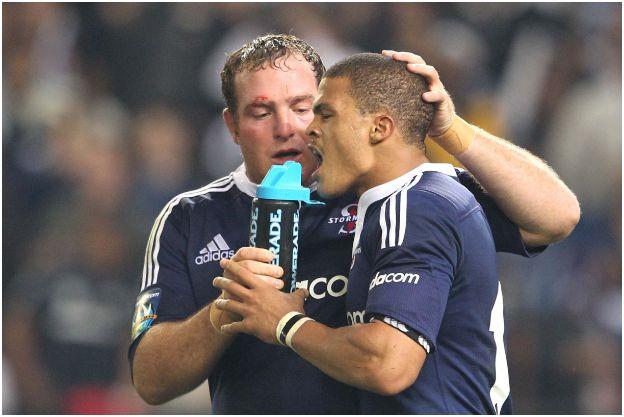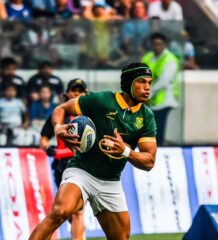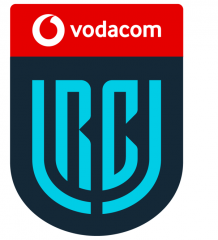Preview to the Super14 Final by Dr Ross Tucker

After 15 weeks of top-notch action in the 2010 Vodacom Super 14, Sports Scientist Ross Tucker – thanks to Powerade, the official fuel of the Super 14 – looks ahead to Saturday’s final between the Bulls and the Stormers.
Ross looks at the various off-field factors that could come into consideration come Saturday at 5pm; touching on – amongst other topics – video analysis, all this talk of momentum (and the Bulls resting their first XV against the Stormers last time out) and, once again, the altitude factor.
A current member of Paul Treu’s SA Sevens management team, Ross Tucker’s final Super 14 column of the season – ahead of the biggest match thus far in 2010 – is not to be missed!
The Build-up
The Bulls and Stormers have duly done what history, and the quality of their squads, suggested they would; with both winning their home semi-finals to set up the desired Vodacom Super 14 Final. A final between two South African teams, in Soweto, only days before the 2010 Football World Cup could not have been scripted better!
The tournament is 15 weeks in, and the focus leading into the 16th and final week will primarily be on the tactical and strategic approach, with videos of previous matches providing the main source of information.
In the Super 14, most teams (SA, Aus and NZ) have a contract with a New Zealand-based company which analyses matches, providing what is known as a ‘coded’ match to coaches and players. All this means it that a team of analysts have watched every Super 14 match and used computer software to pull out relevant aspects of the game, plus the statistics relevant to those aspects. For example, it is possible to analyse how many players the opposition have committed to the breakdown in different areas on the field. One can look who those players are, and discover which players tend to be first, second or third to arrive at rucks. Ball-carriers, tacklers, supporters? All are quantified and collated into shorter clips for analysis. For set-pieces, coaches and players will look at point of attack, starter moves, and likely strategies from different areas on the field, watching from a database of the few hundred scrums and line-outs the opposition have had this year.
This kind of information will help craft a counter-active approach to the opponent. Victor Matfield has earned a reputation of being one of the most studious players in the game, working out the opposition calls and line-out patterns to steal ball. Coaches will rely primarily on experience and intuition to probe for weaknesses and develop plans to neutralise potential strengths. This may seem like overkill, but when you consider that an entire season may rest on a decision made in a split-second, the consequences of inadequate preparation can be severe indeed. At this stage of the season, however, coaches are so familiar with one another that this is unlikely to make the difference in this final week.
Rather, the mental and physical component to performance holds the key. On the mental side, there is the interesting sub-plot that began three weeks ago when the Bulls chose to rest effectively their entire starting team for the final league match of the season against the Stormers – the same team they will now play against in the final.
Reaction was swift and varied, much of it revolving around a perceived momentum shift, and the risk that the Bulls may have handed the Stormers an advantage by putting themselves at risk of a big defeat. On the other hand, many (including Jake White) felt that the Bulls were avoiding the potential of losing the psychological edge, because even a defeat to the Stormers (which did of course happen, 38-10) would always be marked with an asterisk.
History will show that the Stormers won that match easily, and that the Bulls didn’t lose momentum ahead of their semi-final. But now that the return fixture has materialised, the question is likely to return: “What, if anything, does the regular season fixture mean for this weekend’s final?”
I suspect the answer is “nothing”. The media tend to speculate wildly about “momentum”, an intangible concept that says that a winning streak is easy to continue and difficult to stop. The statistics don’t really support this concept. Yes, successful teams get onto winning streaks. Success becomes a habit, as does failure. However, these teams are not necessarily benefitting from momentum – it may be the more simple answer, which is that they win many matches consecutively because they’re the best team! And the truism worth keeping in mind is that momentum is less valuable than quality.
In some cases, a sequence of winning many matches actually predicts a loss, particularly when competition is tight. Call it the law of averages, complacency, or just the nature of sport. Just as in the financial markets, previous success is often not a very good predictor of future success, especially in ultra-competitive sports events! In my opinion, the concept of “momentum” is thus wildly over-rated, unless the players believe it. In that case, it works magic, because it provides a source of confidence. This is why coaches continually reinforce previous results as a motivational factor for players. Saturday’s Super 14 Final has no such history. Yes, the Stormers won the match in the league competition. But the circumstances around the match render the result relatively insignificant for Saturday.
The players will know this too, which means that momentum, a buzz-word of sorts, is irrelevant to the match. Both coaches have acknowledged this, and I’m sure that for once, as soon as the final whistle sounded in Cape Town two weeks ago, the result was forgotten.
Familiarity, on the other hand, is not irrelevant, and that’s a big part of why the match is too close to call. Both teams are full of champions, men who are familiar with the unique routine of a final, the pressure it brings and the expectation on their shoulders. The Bulls and Stormers are packed full of players who have won Super 14s, Tri-Nations, Lions Tours and even World Cups, and so these men and their experience will go a long way to influencing the outcome. For the Bulls, it is déjà-vu from last year, but in a different stadium. For the Stormers, while the experience is new as a team, they have players who will be relied upon to produce their best rugby. The outcome may be determined by which leadership unit asserts control first, and how the younger players are able to feed off their example.
Finally, on the physical side, the altitude is the only factor that is different for the teams. We looked at altitude in the third column of this series, and the habit of teams to delay their arrival for as long as possible. Once again, I believe this to be a mistake, because science tells us that the body only improves at altitude. Therefore, maximum time to adapt would allow maximum chance for best performance, and the Stormers should, based on physiology alone, be in Johannesburg already. It gets a little trickier than this, because the physiological advantage of going earlier may be cancelled out by being away for longer in unfamiliar surroundings. However, delaying the arrival has no physiological benefit, only a mental and social one. This altitude factor is probably less of a problem than many may make out, because our players are so accustomed to playing at altitude, but given how close the result is likely to be, this might just be the factor that decides the result, along with the home-ground advantage, which we’ve already seen is of crucial importance.
Whatever happens, it is sure to be a fabulous occasion and a battle between the two dominant teams this year.
Unfortunately, it also brings to an end this series on the science of rugby. I’d like to thank all for their comments and to Powerade for supporting the scientific approach to the game. Bring on 2011!
Ends
*Powerade Preservative Free Sports Drink is only available in ready-to-drink. Coca-Cola, Powerade and the P device are trademarks of The Coca-Cola Company © 2010
• Issued by Powerade, official fuel to the Vodacom Super 14 players.
• Visuals are courtesy of Gallo Images.
Related Posts
« Bulls and Stormers' winning formulae make it an all South African Super 14 Final! Van Den Heever returns to Bulls Team for Super14 Final »
















